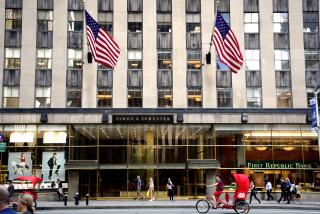Owner of Peet’s to buy coffee pod pioneer Keurig for almost $14 billion
The owner of Peet’s Coffee & Tea is betting big on pod pioneer Keurig Green Mountain Inc. despite signs that the thirst for single-serve coffee brewing may be slowing.
Keurig said Monday that it would be acquired by an
investor group led by Germany’s JAB Holding Co. for an unusually rich $13.9 billion, or $92 a share, a premium of nearly 78% over Keurig’s closing stock price Friday.
After the deal closes, Keurig will be privately owned and will continue to operate independently with its current management team in Waterbury, Vt.
Keurig Chief Executive Brian Kelley called the deal a “new chapter” for the company, whose stock price had fallen more than 40% from the high of the last year. Investors reacted to the proposed transaction by boosting the stock Monday to $88.89, up $37.19, or 72%.
Since its debut in 1998, Keurig has conquered the market for single-serve coffee cups by winning over customers who want convenience and variety. Phil Terpolilli, vice president and healthy lifestyle analyst for Wedbush Securities, estimated that Keurig controls about 85% to 90% of the so-called K-cup market.
“Part of what they did was make the machine affordable, make the machines easy to use,” said Duane Stanford, editor of Beverage Digest, a trade publication for the U.S. nonalcoholic beverage industry.
“Another key aspect of the machine was the ability for other companies to make pods for the brewer, which made it an open system and a more flexible one for consumers,” he said.
But recently, the company’s growth — and that of the industry as a whole — has slowed.
In November, Keurig reported that its fourth-quarter net sales had decreased 13% from the same period a year earlier, a result the company attributed to declines in brewer and pod sales.
Coffee pod sales increased 1% to $3.6 billion while brewer machine sales decreased by 23% to $632.6 million. Keurig estimates that 95% of its consolidated net sales in fiscal year 2015 were attributed to brewers, pods and related accessories.
“While we expect marketplace conditions will remain challenging in the near term, we have a stronger product lineup and price positioning as we enter the new holiday season,” Kelley said at the time.
Part of the slowdown was the introduction of the Keurig 2.0, a hot brewer that was more expensive and less flexible than the previous machine because it rejected rival pods, Stanford said. The company’s new cold drink maker has also been criticized for being too expensive, too big and too slow.
But Stanford cautioned against counting out Keurig in the long term, noting that the company’s original machine was criticized at its onset for being too bulky, slow and pricey.
“They were able to reduce those costs and make it more consumer friendly from a price perspective,” he said. “There’s no reason to believe they won’t do that with the Kold [drink maker], but the question is whether the public has as much desire for
an at-home soft drink maker as they do for a coffee brewer.”
This comes as the market for single-serve coffee pods continues to grow, but at a slower pace than in previous years — a sign that the market is getting more saturated and could be nearing its limit.
“In some ways, people are paying more for a convenient, fresh cup of coffee so they don’t have to worry about a full pot of coffee just baking,” Stanford said. “The question is how many people want to pay a premium for that convenience.”
Keurig has also faced criticism for its throwaway plastic pods, which were designed to eliminate the mess of coffee grounds.
Critics have cited an analyst’s statistic that Keurig produced enough pods last year to circle the globe more than 10 times, and the company’s new hot brewer rejects rival pods, some of which were made of more recyclable materials. The company said it would have fully recyclable pods by 2020.
The environmental aspect has not escaped Keurig user Michael Shearin, 41. He said he agrees that it is “incredibly wasteful” in terms of the cups and the plastics, and has bought coffee pods with biodegradable tops that seem more eco-friendly. He said he uses his machine on weekends.
“I appreciate beautifully made coffee and I don’t think the Keurig makes that quality,” said Shearin, a Los Angeles resident. “That said, it’s incredibly convenient.”
JAB is a privately held group focused on long-term investments for the billionaire Reimann family, heirs to a fortune built through German consumer goods company Benckiser.
The company has controlling stakes in high-fashion brand Jimmy Choo, beauty products manufacturer Coty Inc. and Emeryville, Calif.-based Peet’s. Peet’s recently acquired “super-premium” coffee companies Stumptown Coffee Roasters and Intelligentsia Coffee.
The multiple investments in various coffee enterprises indicates the company’s general approach to reaching coffee aficionados of any kind, said Andrew Alvarez, industry analyst for IBISWorld.
“The great thing about having a stake in all of these different forms of coffee making is that you’re going to be able to benefit and, more importantly, capture the demand of a wide spectrum of consumers,” he said.
Keurig said the acquisition was done in partnership with “strategic minority investors” that are already shareholders in Netherlands-based global coffee and tea company Jacobs Douwe Egberts, including Mondelez International and entities affiliated with investment firm BDT Capital Partners. Jacobs Douwe Egberts owns Maxwell House and Keurig rival Tassimo, among other coffee and tea brands.
“Keurig Green Mountain represents a major step forward in the creation of our global coffee platform,” JAB Chairman Bart Becht said in a statement. “It is a fantastic company that uniquely brings together premium coffee brands and new beverage dispensing technologies like the famous Keurig single-serve machine.”
The Keurig acquisition
indicates that there’s still an interest in capturing the single-serve demographic, despite the company’s difficulties, Alvarez said.
“It’s still lucrative enough to feel like it’s a good long-term investment because the cups and the technology can only become more efficient and eco-friendly over time,” he said.
“Acquiring Keurig is one of those ways they can capitalize on what they think is a good opportunity and a good format that is dealing with some issues now but could potentially, with the right kind of investment … can get back on its feet.”
Twitter: @smasunaga
More to Read
Inside the business of entertainment
The Wide Shot brings you news, analysis and insights on everything from streaming wars to production — and what it all means for the future.
You may occasionally receive promotional content from the Los Angeles Times.











